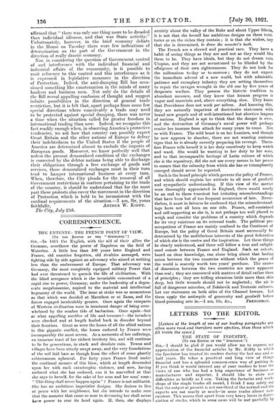CORRESPONDENCE.
THE ENTENTE: THE FRENCH POINT OF VIEW.
[TO THE EDITOR OF THE "SPECTATOR.") Sin,—In 1315 the English, with the aid of their allies the Germans, overthrew the power of Napoleon on the field of Waterloo. A little less than 100 years later England and France, old enmities forgotten, old rivalries assuaged, were fighting side by side against an adversary who aimed at nothing leas than the enslavement of Europe. That adversary was Germany, the most completely equipped military Power that had ever threatened to quench the life of civilization. With the blind arrogance which is the invariable concomitant of a rapid rise to power, Germany, under the leadership of a degen- erate megalomaniac, aspired to the material and intellectual hegemony of the world. The issue at stake was as momentous as that which was decided at Marathon or at Zama, and the forces engaged incalculably greater. Once again the ramparts of Western civilization were in imminent danger of being over- whelmed by the sombre tide of barbarism. Once again—but at what appalling sacrifice of life and treasure !—the invaders were checked and at length hurled back in disorder beyond their frontiers. Great as were the losses of all the allied nations in this gigantic conflict, the losses endured by France were incomparably the most severe. As a memento of her sufferings, an immense tract of her richest territory lies, and will continue to lie for generations, in stark and desolate ruin. Towns and villages have been utterly swept away, and the very foundations of the soil laid bare as though from the effect of some ghastly subterranean upheaval. For forty years France lived under the continual menace of this blow, which at length descended upon her with such catastrophic violence, and now, having endured what she has endured, can it be marvelled at that she says to herself, for the sake of her sons and her sons' eons: "This thing shall never happen again" France is not militarist. She has no ambitious imperialist designs. She desires to live at peace with her neighbours, but she intends to make sure that the monster that came so near to devouring her shall never have power to rear its head again. If, then, she displays anxiety about the valley of the Ruhr and about Upper Silesia, it is not that she herself has ambitious designs on these tern. tories or on the riches they contain ; it is that she wishes, nay that she is determined, to draw the monster's teeth.
The French are a shrewd and practical race. They have a habit of seeing things as they are and not as they would like them to be. They have ideals, but they do not dream vain Utopias, and they are not accustomed to be blinded by the effulgence of their own righteousness. They do not look for the millennium to-day or to-morrow ; they do not expect the immediate advent of a new world, but with admirable patience and exemplary industry they are setting themselves to repair the ravages wrought in the old one by five years of desperate warfare. They possess the historic tradition in abundant measure, and they know that human progress is vague and uncertain and, above everything, slow. They know that Providence does not work per sallum. And knowing this, they are naturally impatient of doctrinaire statesmen with brand new gospels and of well-intentioned but abortive leagues of nations. England is apt to think that the danger is over, and the destruction of Germany's naval power will perhaps render her immune from attack for many years to come. Not so with France. The wild beast is on her frontiers, and though he now appears to slumber, there are not wanting ominous signs that he is already covertly preparing his revenge. There- fore France tells herself it is her duty ceaselessly to keep watch and ward. She would be wanting in her duty to her sons, and to that incomparable heritage of Latin culture of which she is the repository, did she not use every means in her power to ensure that the calamity from which she has so triumphantly emerged should never be repeated.
Such is the broad principle which governs the policy of France, and which should explain her attitude to all men of goodwill and sympathetic understanding. If this view of the matter were thoroughly appreciated in England, there would surely be an end to those transient but irritating misunderstandings that have been but of too frequent occurrence of late. Never- theless, it must in fairness be confessed that the misunderstand- ings have not all been on one side. France, self-contained and self-supporting as she is, is not perhaps too well placed to weigh and consider the problems of a country which depends for its very existence on its external trade. The political pre- occupations of France are mainly confined to the Continent of Europe, but the policy of Great Britain must necessarily be determined by the multifarious interests of the great federation of which she is the centre and the inspiration. Let these things be clearly understood, and there will follow a true and enlight- ened entente between France and England. Such an enknte, based on clear knowledge, can alone bring about that lasting union between the two countries without which the peace of the world is scarcely worth two years' purchase. The causes of dissension between the two countries are more apparent than real ; they are concerned with matters of detail rather than of principles ; they are trifling abrasions little more than skin deep, but little wounds should not be neglected ; the air is full of dangerous microbes, of Bolshevik and Teutonic cultures. Let our statesmen on both sides of the Channel beware. Let them apply the antiseptic of generosity and goodwill before blood-poisoning sets in.—I am, Sir, &c., FRENCHMAN.


































 Previous page
Previous page